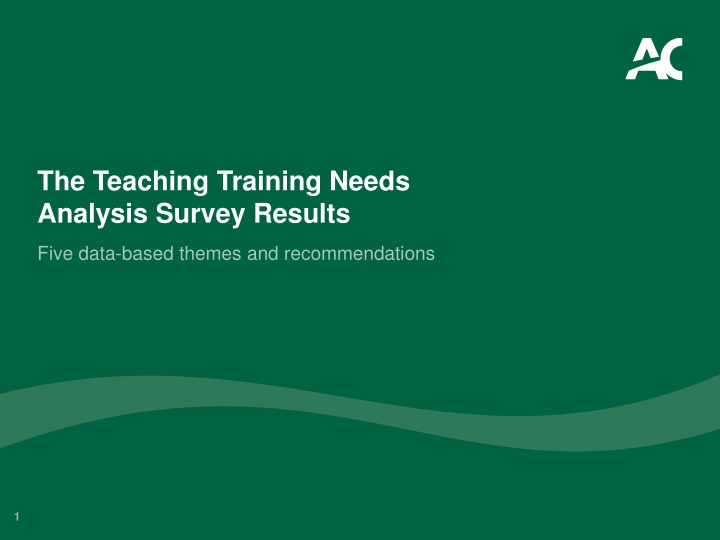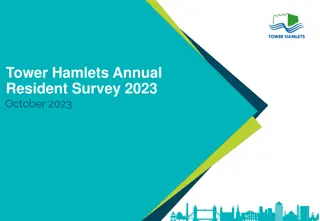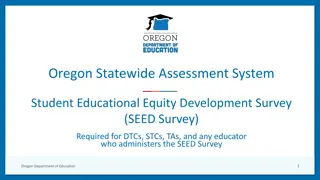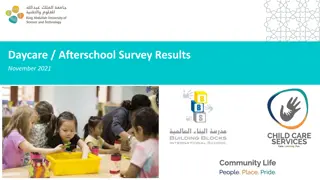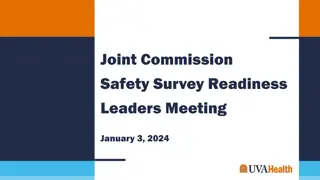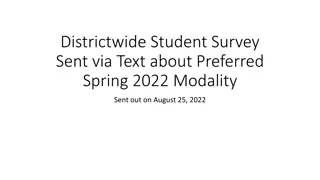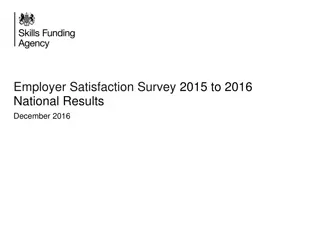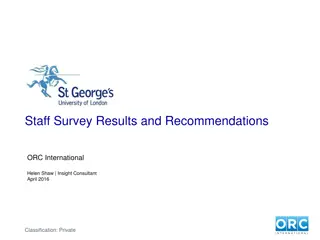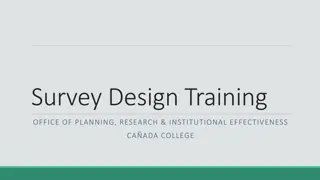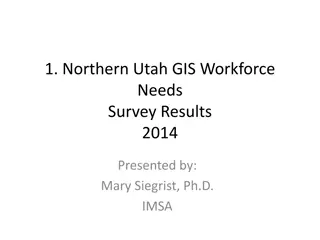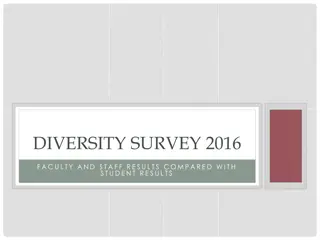Teaching Training Needs Analysis: Survey Results & Recommendations
Findings of a survey conducted to assess the teaching training needs at Algonquin College. Discover key themes, recommendations, and feedback from faculty members. Gain insights into satisfaction levels, access to development opportunities, and preferences for training programs.
Download Presentation

Please find below an Image/Link to download the presentation.
The content on the website is provided AS IS for your information and personal use only. It may not be sold, licensed, or shared on other websites without obtaining consent from the author.If you encounter any issues during the download, it is possible that the publisher has removed the file from their server.
You are allowed to download the files provided on this website for personal or commercial use, subject to the condition that they are used lawfully. All files are the property of their respective owners.
The content on the website is provided AS IS for your information and personal use only. It may not be sold, licensed, or shared on other websites without obtaining consent from the author.
E N D
Presentation Transcript
The Teaching Training Needs Analysis Survey Results Five data-based themes and recommendations 1
Background and Objectives Winter 2019: Teaching and Learning Advisory Group (TLAG) created Spring 2019: TLAG recommends and develops college-wide teaching training needs survey to capture the voices of LTS s clientele August 2019: survey launched for 2 weeks 2
Five Key Questions to Explore Are professors/instructors generally satisfied with the teaching training development offered at Algonquin College? Are there any barriers to accessing development opportunities and if so, what are they? How and when do professors/instructors want training offered? Is the current marketing and outreach of programs effective in spreading awareness about training opportunities at Algonquin College? What topics do professors/instructors want to learn about in training? 3
Results 324 faculty members responded to the survey from across the college, including the Perth and Pembroke campuses - which represents a response rate of 10%* Based on a sample size of 324 and total population of 3159 (Algonquin College, 2019). This represents a confidence level of 95%, +/- 5%. 4
Results full-time professors (51.86%; N=167) part-time professors (26.09%; N=84) partial load professors (18.01%; N=58) 5-9 years experience teaching (25.39%; N=82) 10-14 years experience teaching (18.58%; N=60) face-to-face courses (90.09%, N=291) hybrid courses (61.92%, N=200) teaching lab/clinic/shop/field courses (35.60%; N=115) online courses (17.34%; N=56) 5
High-level Findings General Satisfaction 63% of respondents chose either very satisfied or somewhat satisfied when asked how satisfied they were with the teaching development training offered Ease of Access 69.91% of respondents answered yes when asked if they were able to easily access teaching development training at Algonquin College 6
I think you are doing a great job! I very much appreciate all the effort that goes into helping profs. Continue the great work! Faculty really appreciate your time and effort in supporting the learning environment.
Analysis: Five Themes Awareness of Training Modality and Scheduling Part-time/Partial Load Faculty Relevance of Training Content Upgrade 8
Theme 1: Awareness of Training Opportunities Respondents reported: Not hearing about training opportunities in a timely fashion Not having sufficient conversations with anyone about what type of training they might need or have access to Preferring to discuss training needs with either their Chairs during performance reviews and/or with educational developers throughout the year 9
I feel we need help in managing our personal PD. We need to collaborate with someone who could help us each design the most appropriate, individual PD (both internal and external). We probably should be doing this with our Chairs but annual reviews are not taking place regularly and I'd prefer the guidance and advice of a LTS expert.
Theme 1 Recommendations 1.Design an easy to follow teaching development roadmap for simple marketing that can be distributed via one channel and tracked in one area for both registration and attendance. 2.Run frequent presentations and workshops for departmental chairs to inform them about training opportunities; including FITS.* 3.Re-design LTS website to include a calendar of events with frequent updates. 4.Publish a monthly newsletter to be distributed to departments listing all the training opportunities available for the month. *This is already in development through Academic Development in a system called Faculty Individualized Training System (FITS) 11
Theme 2: Part-time/partial load faculty Respondents reported: Part-time and partial load faculty face significantly more barriers to teaching development for three reasons: time Lack of compensation general support of college 12
Regular Part-time and Partial-load faculty need to be given more avenues for their development As a part-time professor the PD courses are at times that don't work for a regular full-time job outside of the College I believe that we should be paying part-time faculty for their time.
Theme 2 Recommendations 1.Pay part-time faculty to attend training. 2.Research and recommend different models of part-time faculty orientation initiatives (ie: St. Lawrence College has a 2-day pre-semester meet and greet) 3.Liaise with associate chairs to determine PT faculty training needs. 14
Theme 3: Relevance of Training Respondents reported: 1.Wanting to go beyond 101 and basic training to more advanced training opportunities for experienced teachers. 2.Wanting more discipline/industry-specific training on how to teach specific content well. 3.Wanting training targeted to specific teaching modalities; specifically teaching online or teaching in labs/shops/clinics. 15
PD at very basic/intro levels; not individualized or targeted to personal needs PD at very basic/intro levels; not individualized or targeted to personal needs does not differentiate by different course types being taught ie theory vs practical vs field;
Theme 3 Recommendations 1.Recruit (and fund through course release) faculty liaisons from each school to design and deploy more discipline- specific offerings within LTS 2.Create levelling within FITS for foundational, enhancement and specialized training. Provide participants with self- assessment tools/access to educational developers to determine level placement 3.Develop and deploy an Online Teaching Institute and Teaching in Labs/Shops Institute within FITS s specialized training cluster 17
Theme 4: Content Upgrade Respondents reported: non-teaching content (ie: Workday training, progression to leadership roles, industry-training) diversity, inclusion and social justice (including LGTBQ+, FNMI, and international students-specific training) teaching students with disabilities and mental health concerns assessment classroom management and behaviour-focused training 18
Theme 4: Content Upgrade Educational Theories: Applying Universal Design for Learning in your Teaching Educational Theories: Learning about Teaching Theories and Models Assessment: Designing Assessments Educational Technology: Advanced Brightspace skills Educational Technology: New Ideas in Teaching with Technology Educational Technology: Teaching with Technology Basics Curriculum and Course Development: Designing Culturally Inclusive Course Curriculum and Course Development: Designing Courses with Universal Design Curriculum and Course Development: Course Tune-up (improving an existing Curriculum and Course Development: Designing Effective Courses Curriculum and Course Development: Designing Effective Online or Hybrid Inclusive Teaching Strategies: Supporting International Students Inclusive Teaching Strategies: Gender diversity in learning environments Classroom Management: Plagiarism Prevention Strategies Classroom Management: Managing disruptive behaviour in the classroom Classroom Management: Online class management and moderation Classroom Management: Classroom management foundations Instructional Strategies: Lesson Planning Instructional Strategies: Active Instructional Strategies Instructional Strategies: Facilitating Group Work Enhancing Engagement: Student Engagement Strategies in classrooms Enhancing Engagement: Student Engagement Strategies online 0 20 40 60 80 100 120 140 160 180 200 19
Teaching through a social justice lens - meaningfully embedding equity issues into the curriculum - meaningful indigenization of our curriculum Positive Space Training offered more often Working with learning disabilities Dealing with students with disabilities beyond what we have training for (PTSD, autism)
Theme 4 Recommendations 1. New offerings with FITS to match faculty training needs 21
Theme 5: Modality and Scheduling of Training Respondents reported: Training constantly fell during teaching times Training sessions not offered often enough Attending face-to-face sessions was difficult Broadening how training was delivered beyond workshops: online repositories, more one-on-one coaching, more mentoring opportunities and hosting teaching-focused conferences 22
Theme 5: Modality and Scheduling of Training Other self-directed online activities Teaching conferences and/or events Mentoring, Coaching, individual consultation combine Online self-directed modules Online module/webinar using collaborative meeting software (Adobe Presenter, etc.) Informal discussion on designated topics (e.g., Community of Practice) Multi-session workshop Single-session workshop 0 50 100 150 200 250 300 23
My attendance is usually dictated by scheduling. I seem to be teaching on the hours that the PD is provided. Not enough availability time slots Lack of flexibility in delivery (couldn't come to f2f class) We need a teaching conference to bring ideas together.
Theme 5 Recommendations 1. Offer more instructional coaching through LTS and advertise more broadly and more frequently 2. Develop complementary online modules for all enhanced training sessions in FITS 3. Host the same workshops more frequently; including evenings 4. Host an annual teaching conference 25
